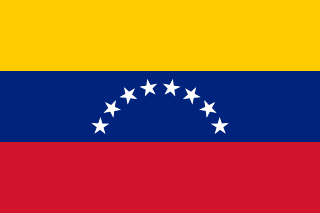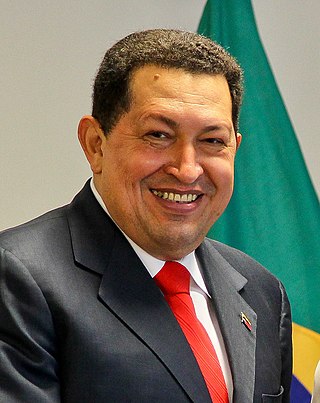This is a list of wars involving the Bolivarian Republic of Venezuela and its predecessor states from 1810 to the present.
This is a list of wars involving the Bolivarian Republic of Venezuela and its predecessor states from 1810 to the present.

Venezuela, officially the Bolivarian Republic of Venezuela, is a country on the northern coast of South America, consisting of a continental landmass and many islands and islets in the Caribbean Sea. Venezuela comprises an area of 916,445 km2 (353,841 sq mi), and its population was estimated at 29 million in 2022. The capital and largest urban agglomeration is the city of Caracas.

Hugo Rafael Chávez Frías was a Venezuelan politician and military officer who served as president of Venezuela from 1999 until his death in 2013, except for a brief period of forty-seven hours in 2002. Chávez was also leader of the Fifth Republic Movement political party from its foundation in 1997 until 2007, when it merged with several other parties to form the United Socialist Party of Venezuela (PSUV), which he led until 2012.

Caracas, officially Santiago de León de Caracas (CCS), is the capital and largest city of Venezuela, and the center of the Metropolitan Region of Caracas. Caracas is located along the Guaire River in the northern part of the country, within the Caracas Valley of the Venezuelan coastal mountain range. The valley is close to the Caribbean Sea, separated from the coast by a steep 2,200-meter-high (7,200 ft) mountain range, Cerro El Ávila; to the south there are more hills and mountains. The Metropolitan Region of Caracas has an estimated population of almost 5 million inhabitants.

Danny Lebern Glover is an American actor, producer and political activist. Over his career he has received numerous accolades including the Jean Hersholt Humanitarian Award from the Academy of Motion Picture Arts and Sciences, the NAACP's President's Award, as well as nominations for five Emmy Awards and four Grammy Awards.

The Venezuela national football team represents Venezuela in men's international football and is controlled by the Venezuelan Football Federation (FVF), the governing body for football in Venezuela. They are nicknamed La Vinotinto. When playing at home in official games, they usually rotate between three stadiums: The Polideportivo Cachamay in Puerto Ordaz, the Estadio José Antonio Anzoátegui in Puerto La Cruz and the Estadio Pueblo Nuevo in San Cristóbal. In friendly matches, they tend to rotate between the rest of the stadiums in the country.

The Inter-American Treaty of Reciprocal Assistance is an intergovernmental collective security agreement signed in 1947 in Rio de Janeiro among many countries of the Americas.

The cultures of Venezuela are diverse and complex, influenced by the many different people who have made Venezuela their home. Venezuela has distinctive and original art, literature and music.

The history of the Jews in Venezuela dates to the middle of the 17th century, when records suggest that groups of marranos lived in Tucacas, Caracas and Maracaibo. The Jewish community, however, did not become established in Venezuela until the middle of the 19th century. Since Hugo Chávez took power in 1999, tension has existed between the government and Jewish population, which has seen large numbers emigrating. Today, the majority of Venezuelan Jews live in Israel, while modern-day Venezuela continues to host a modest Jewish population.

Historically speaking, bilateral relations between the various countries of Latin America and the United States of America have been multifaceted and complex, at times defined by strong regional cooperation and at others filled with economic and political tension and rivalry. Although relations between the U.S. government and most of Latin America were limited prior to the late 1800s, for most of the past century, the United States has unofficially regarded parts of Latin America as within its sphere of influence, and for much of the Cold War (1947–1991), actively vied with the Soviet Union for influence in the Western Hemisphere.

Relations between Cuba and Venezuela were established in 1902. The relationship deteriorated in the 1960s and Venezuela broke relations in late 1961 following the Betancourt Doctrine policy of not having ties with governments that had come to power by non-electoral means. A destabilizing factor was the Cuban support for the antigovernment guerrilla force that operates in remote rural areas. Venezuela broke off relations with Cuba after the Machurucuto invasion in 1967, when Cuban trained guerrillas landed in Venezuela seeking to recruit guerrillas and overthrow the government of Raúl Leoni. Relations were reestablished in 1974.

Venezuelans are the citizens identified with the country of Venezuela. This connection may be through citizenship, descent or cultural. For most Venezuelans, many or all of these connections exist and are the source of their Venezuelan citizenship or their bond to Venezuela.

Under the rule of President Hugo Chávez who was elected President of Venezuela in 1998, relations between Israel and Venezuela rapidly deteriorated as Venezuela strongly supported the rights of the Palestinians and condemned Israeli actions, twice expelling the Israeli ambassador from Venezuela. Venezuela officially recognized the State of Palestine and established diplomatic relations with the Palestinian Authority on 27 April 2009.

Isaías Medina Angarita was a Venezuelan military and political leader, the president of Venezuela from 1941 until 1945, during World War II. He followed the path of his predecessor Eleazar López Contreras, and ruled the country's democratic transition process.
Polish Venezuelans are Venezuelan citizens of full or partial Polish ancestry. The Polish colony in Venezuela is well dispersed throughout the country, but most of the Poles and their descendants live in big cities like Caracas, Maracaibo and Valencia.

The history of Venezuela during World War II is marked by dramatic change to the country's economy, military, and society. At the beginning of World War II in 1939, Venezuela was the world's leading oil exporter, and subsequently one of the main beneficiaries of the American Lend-Lease programs. Economic assistance from the United States, as well a booming oil industry, led Venezuela to become one of the few Latin American countries that was able to finance its own modernization in the post-war era. Furthermore, through skillful diplomacy, Venezuela was able to gain territory, increase its share in oil profits, and also reduce its reliance on foreign oil companies.

An ongoing socioeconomic and political crisis began in Venezuela during the presidency of Hugo Chávez and has worsened during the presidency of his successor Nicolás Maduro. It has been marked by hyperinflation, escalating starvation, disease, crime and mortality rates, resulting in massive emigration from the country.

Poland–Venezuela relations refers to the bilateral relations between Poland and Venezuela.

Netherlands–Venezuelan relations are the bilateral relations between the Netherlands and Venezuela.

During World War I, Venezuela maintained a position of neutrality in the four years of the conflict during the dictatorship of Juan Vicente Gómez. Por its position, his government was pressured and threatened by the conflict belligerants, and Gómez was accused of having pro-German sympathies. Gómez used the position of Victorino Márquez Bustillos as provisional president, in practice a "prime minister", to refuse to discuss changing his stance.

Germany–Venezuela relations have a long tradition and were officially established in 1871. During Nicolás Maduro's tenure, relations have deteriorated and in 2019 Venezuela declared the German Ambassador Daniel Kriener a persona non grata; however, he was able to return to the country soon after. Close relations with Venezuela continue to be maintained by parts of the German left and the political party Die Linke.